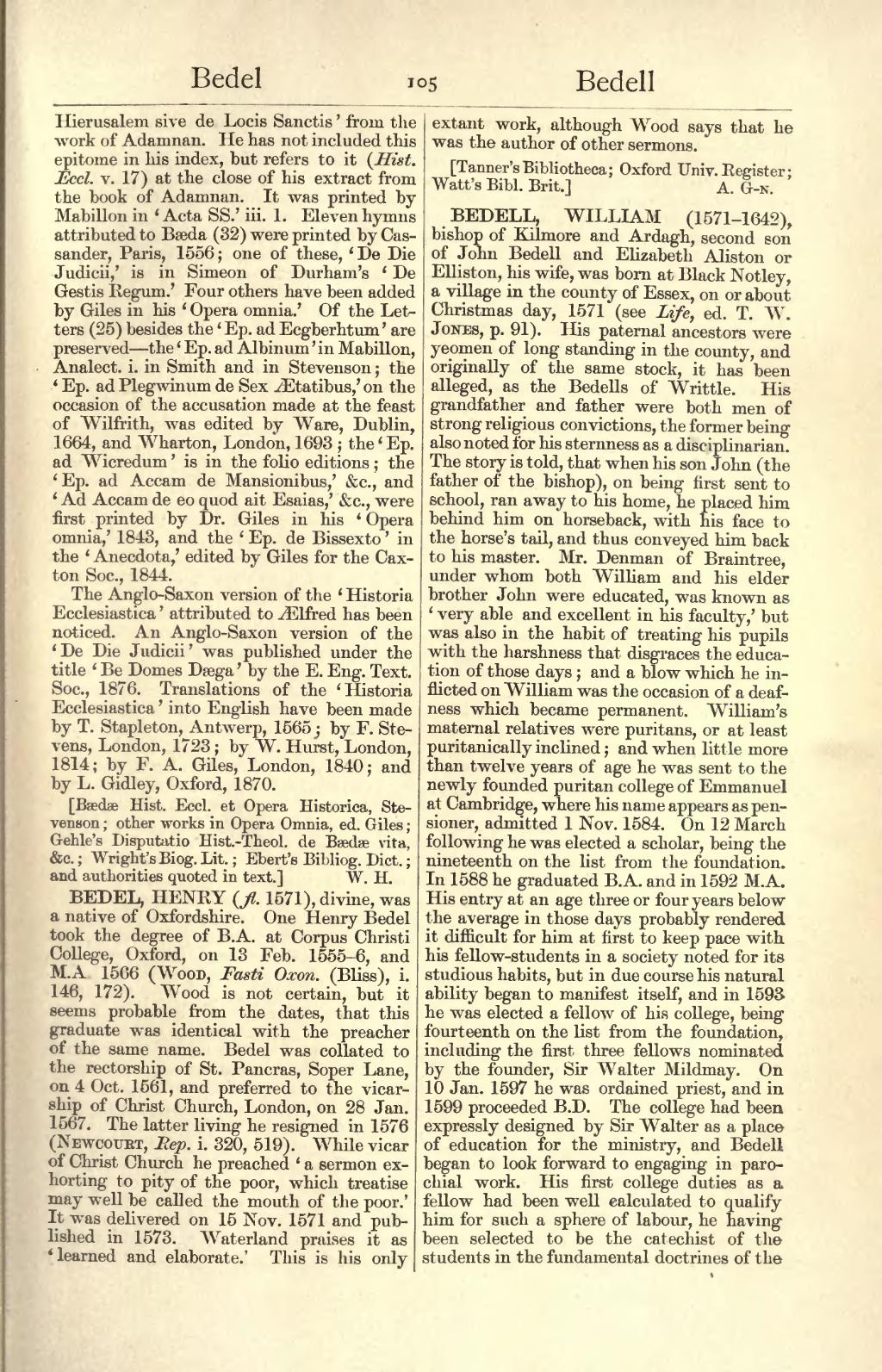Hierusalem sive de Locis Sanctis' from the work of Adamnan. He has not included this epitome in his index, but refers to it (Hist. Eccl. v. 17) at the close of his extract from the book of Adamnan. It was printed by Mabillon in 'Acta SS.' iii. 1. Eleven hymns attributed to Bæda (32) were printed by Cassander, Paris, 1556; one of these, 'De Die Judicii,' is in Simeon of Durham's 'De Gestis Regum.' Four others have been added by Giles in his 'Opera omnia.' Of the Letters (25) besides the 'Ep. ad Ecgberhtum' are preserved — the 'Ep. ad Albinum' in Mabillon, Analect. i. in Smith and in Stevenson; the 'Ep. ad Plegwinum de Sex Ætatibus,' on the occasion of the accusation made at the feast of Wilfrith, was edited by Ware, Dublin, 1664, and Wharton, London, 1693; the 'Ep. ad Wicredum' is in the folio editions; the 'Ep. ad Accam de Mansionibus,' &c., and 'Ad Accam de eo quod ait Esaias,' &c., were first printed by Dr. Giles in his 'Opera omnia,' 1843, and the 'Ep. de Bissexto' in the 'Anecdota,' edited by Giles for the Caxton Soc., 1844.
The Anglo-Saxon version of the 'Historia Ecclesiastica' attributed to ÆIfred has been noticed. An Anglo-Saxon version of the 'De Die Judicii' was published under the title 'Be Domes Dæga' by the E. Eng. Text. Soc., 1876. Translations of the 'Historia Ecclesiastica' into English have been made by T. Stapleton, Antwerp, 1565; by F. Stevens, London, 1723; by W. Hurst, London, 1814; by F. A. Giles, London, 1840; and by L. Gidley, Oxford, 1870.
[Bædæ Hist. Eccl. et Opera Historica, Stevenson; other works in Opera Omnia, ed. Giles; Gehles Disputatio Hist-Theol. de Bædæ vita. &c.; Wright's Biog. Lit.; Ebert's Bibliog. Dict.; and authorities quoted in text.]
BEDEL, HENRY (fl. 1571), divine, was
a native of Oxfordshire. One Henry Bedel
took the degree of B.A. at Corpus Christi
College, Oxford, on 13 Feb. 1555-6, and
M.A. 1566 (Wood, Fasti Oxon. (Bliss), i.
146, 172). Wood is not certain, but it
seems probable from the dates, that this
graduate was identical with the preacher
of the same name. Bedel was collated to
the rectorship of St. Pancras, Soper Lane,
on 4 Oct. 1561, and preferred to the vicarship of Christ Church, London, on 28 Jan.
1567. The latter living he resigned in 1576
(Newcourt, Rep. i. 320, 519). While vicar
of Christ Church he preached 'a sermon exhorting to pity of the poor, which treatise
may well be called the mouth of the poor.'
It was delivered on 15 Nov. 1571 and published in 1573. Waterland praises it as
'learned and elaborate.' This is his only
extant work, although Wood says that he
was the author of other sermons.
[Tanner's Bibliotheca; Oxford Univ. Register; Watt's Bibl. Brit.]
BEDELL, WILLIAM (1571–1642), bishop of Kilmore and Ardagh, second son of John Bedell and Elizabeth Aliston or Elliston, his wife, was born at Black Notley, a village in the county of Essex, on or about Christmas day, 1571 (see Life, ed. T. W. Jones, p. 91). His paternal ancestors were yeomen of long standing in the county, and originally of the same stock, it has been alleged, as the Bedells of Writtle. His grandfather and father were both men of strong religious convictions, the former being also noted for his sternness as a disciplinarian. The story is told, that when his son John (the father of the bishop), on being first sent to school, ran away to his home, he placed him behind him on horseback, with his face to the horse's tail, and thus conveyed him back to his master. Mr. Denman of Braintree, under whom both William and his elder brother John were educated, was known as ‘very able and excellent in his faculty,’ but was also in the habit of treating his pupils with the harshness that disgraces the education of those days; and a blow which he inflicted on William was the occasion of a deafness which became permanent. William's maternal relatives were puritans, or at least puritanically inclined; and when little more than twelve years of age he was sent to the newly founded puritan college of Emmanuel at Cambridge, where his name appears as pensioner, admitted 1 Nov. 1584. On 12 March following he was elected a scholar, being the nineteenth on the list from the foundation. In 1588 he graduated B.A. and in 1592 M.A. His entry at an age three or four years below the average in those days probably rendered it difficult for him at first to keep pace with his fellow-students in a society noted for its studious habits, but in due course his natural ability began to manifest itself, and in 1593 he was elected a fellow of his college, being fourteenth on the list from the foundation, including the first three fellows nominated by the founder, Sir Walter Mildmay. On 10 Jan. 1597 he was ordained priest, and in 1599 proceeded B.D. The college had been expressly designed by Sir Walter as a place of education for the ministry, and Bedell began to look forward to engaging in parochial work. His first college duties as a fellow had been well calculated to qualify him for such a sphere of labour, he having been selected to be the catechist of the students in the fundamental doctrines of the
